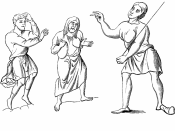The emancipation of the serfs in Russia was the only genuine reform introduced by Alexander II.
To what extend do you agree with this assertion?Taking a humanitarian perspective, the historian J.N. Westwood argued that "despite its imperfections the emancipation was an enormous step forward", quoted from Endurance and Endeavour, Russian History 1812-1986. Taking into account that the abolishment of the serfdom around 1861 was a great breakthrough, the question is who benefited from this restructuring. Alexander II, fearing a revolution, wanted to reform the social organisation economically rather than militarily. However, apart from the abolishment of serfdom, there were a number of reforms in many areas, including the army, administrative organisation, judicial system and the education. Concluding, I agree that the emancipation of the serfs in Russia was Alexander's key reform, but several other important reforms were introduced, too, and their consequences must be assessed.
After Russia's defeat in the Crimean war from 1853-1856, the weak army reflected the general situation of Russia, under developed and behind the west, lacking of innovation, motivation and therefore progression.
As Russia's population grew during the 19th century, the production was not increasing, causing massive economic and social problems. Alexander hoped to solve this problem by introducing free labour, which he considered more liable, what proofed right I Siberia. Furthermore, the fact that many landlords had mortgaged their serfs to the state created a false, instable economy. Socially, the established system of serfdom led to suppression and injustice towards the peasants, resulting in peasant riots all over the country, increasing rapidly from 1845 onwards. Reacting to this threatening development, Alexander II, driven by the will to preserve his autocratic inheritance, wanted to reform the system "from above rather, than from below" 1 , expressing his fear of revolution. On the other hand, Alexander II,


